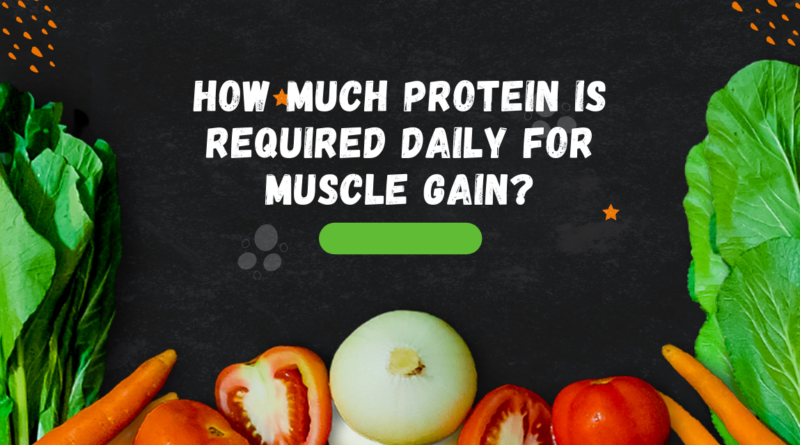How Much Protein Is Required Daily For Muscle Gain?
Are you wondering how much protein is required daily for muscle gain? You’re not alone! It’s crucial to get the right amount of protein for muscle growth. Protein is the crucial building block for your muscles’ construction crew. Without enough, they can’t correctly repair and build muscle tissue, slowing your progress. Spread your protein intake evenly throughout the day to maximize muscle growth. Include protein-rich foods like chicken, fish, eggs, dairy, beans, and nuts in your meals and snacks. And remember to stay hydrated! With the right protein intake and a balanced diet, your muscles will be well on their way to becoming bigger and stronger.
Understanding Protein Needs
Before we dive into figuring out how much protein you should eat, let’s take a moment to understand what protein does in your body. Imagine protein as the building blocks, like the bricks, for your muscles. When you work out or do any physical activity, your muscles can get little tears in them. It’s a natural part of the process. But don’t worry! This is where protein comes to the rescue. It acts like a repair kit for your muscles, helping to mend those tiny tears. As your muscles heal, they become even stronger and grow bigger than before. So, getting enough protein is like giving your muscles the tools they need to become stronger and more powerful.
Calculating Your Protein Requirement
You can use a handy tool called a protein calculator to figure out the right amount of protein for muscle building. These calculators consider things like how much you weigh, how active you are, and what you want to achieve with your fitness routine. By plugging in this information, you can get a personalized estimate of how much protein your body needs to support muscle growth effectively. It’s like having a virtual nutritionist at your fingertips, helping you make informed decisions about your protein intake. Generally, aiming for about 1.6 to 2.2 grams of protein per kilogram of body weight per day is a good target. You’ll want to incorporate protein-rich foods into your meals and snacks throughout the day to achieve this. Think of it as spreading your protein intake like spreading peanut butter on toast—nice and evenly! This ensures your muscles have a steady supply of the nutrients they need to grow and repair themselves. So, let’s explore some tasty and nutritious ways to pack in that protein and fuel your muscle-building journey!
High Protein Foods for Muscle Building
Now that you’ve got an idea of how much protein you need, let’s talk about some delicious ways to get it into your diet! We’re talking about high-protein foods that are like fuel for your muscles—helping them grow bigger and stronger. By adding these foods to your meals and snacks, you can easily meet your protein goals and get closer to your muscle-building dreams. So, let’s dive into some mouthwatering options that’ll have you feeling pumped and ready to conquer your fitness goals!
- Chicken Breast: Lean and versatile, it provides around 30 grams of protein per 3-ounce serving.
- Greek Yogurt: Creamy and rich, offering about 20 grams of protein per 6-ounce serving.
- Eggs: Nature’s protein-packed marvels, with approximately 6 grams of protein each.
- Salmon: Delicious and full of protein, delivering about 25 grams per 3-ounce serving, along with omega-3 fatty acids.
- Beans and Lentils: Vegetarian-friendly protein sources, providing around 15 grams per cooked cup.
- Lean Beef: Classic protein choice, offering roughly 25 grams of protein per 3-ounce serving, especially in lean cuts.
- Quinoa: Gluten-free grain packed with protein, offering about 8 grams per cooked cup.
- Cottage Cheese: Versatile and creamy, boasting around 14 grams of protein per half-cup serving.
- Turkey Breast: Lean and tasty, providing about 24 grams of protein per 3-ounce serving.
- Tofu: Plant-based protein option, with approximately 10 grams of protein per 3-ounce serving, perfect for various dishes.
Balanced Diet for Muscle Gain
Absolutely, protein is important, but balance is key for overall muscle growth and wellbeing. Make sure to incorporate a wide range of foods from all food groups into your diet to provide your body with essential nutrients. This includes fruits, vegetables, whole grains, healthy fats, and sources of protein. By eating a diverse array of foods, you’ll ensure that your body gets all the vitamins, minerals, and other nutrients it needs to support muscle growth, recovery, and overall health.
Workout Routine for Muscle Gain
To maximize muscle growth, you need a well-rounded workout routine. Here’s a breakdown of essential components:
- Weight Lifting: Focus on compound exercises like squats, deadlifts, and bench presses to target multiple muscle groups simultaneously.
- Resistance Training: Incorporate resistance bands or weights to increase the intensity of your workouts.
- Overall Body Workout: Ensure you target all major muscle groups, including chest, back, legs, shoulders, arms, and core.
- Strength Training Program: Follow a structured program that gradually increases the weight and intensity of your workouts over time.
- Workout Schedule: Aim for consistency by scheduling regular workout sessions throughout the week.
Best Supplements for Muscle Growth
While whole foods should be your primary source of nutrients, certain supplements can support your muscle-building efforts. Here are some popular options:
- Whey Protein: A fast-absorbing protein powder that can be consumed post-workout to promote muscle recovery.
- Creatine: Helps increase strength and power during high-intensity exercises.
- Branched-Chain Amino Acids (BCAAs): Support muscle protein synthesis and reduce muscle fatigue during workouts.
- Beta-Alanine: Improves endurance and delays muscle fatigue by buffering lactic acid buildup.
- Multivitamins: Ensure you’re meeting your daily requirements for essential vitamins and minerals.
In conclusion, understanding how much protein is required daily for muscle gain is essential for anyone looking to build strength and size. By calculating your protein needs, incorporating high protein foods into your diet, and maintaining a balanced diet, you can support your muscle growth effectively. Additionally, incorporating bodybuilding and strength training into your routine can further enhance your results. For valuable insights and guidance on muscle gain and overall fitness, turn to Guest Blogging Pro for expert advice and resources tailored to your needs. Start your journey to a stronger, healthier body today!




